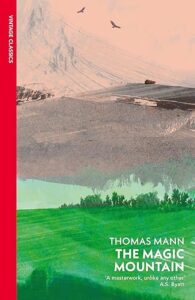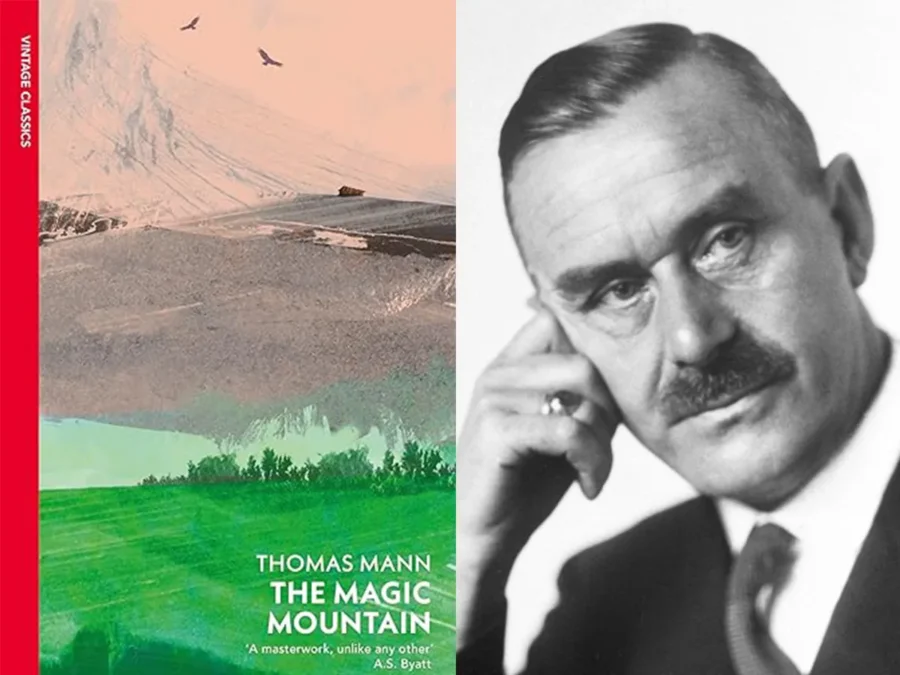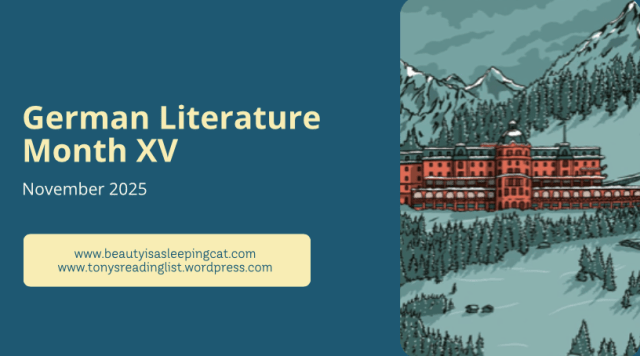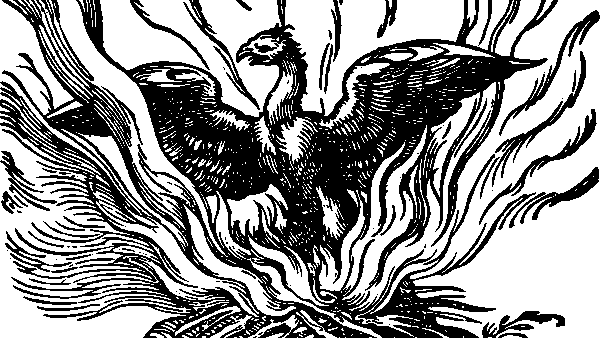Deep themes are explored in this slow, meditative novel set high in the Swiss Alps.
Hans Castorp was only supposed to be visiting the sanatorium for three weeks, but he ends up staying seven years. That’s the basic premise of The Magic Mountain, but the novel is so much more than that. Thomas Mann takes us on a 750-page journey through deeper themes such as the nature of time, mortality, war, duty, and much more.
The sanatorium is in Davos, and it houses patients from all over Europe who’ve come to be treated for tuberculosis and to recuperate in the rarefied air of the high Swiss Alps. Hans Castorp’s cousin Joachim is one of them, and the idea is for young Hans to spend three weeks relaxing and cheering up his cousin before starting his career as a shipbuilder in Hamburg.
Immediately, however, Hans senses something different about the place. Joachim talks strangely about the place, sounding so remote and disconnected from the rest of the world, which up here they refer to as “the flatland.” The rituals of the sanatorium seem strange to Hans, and he struggles to acclimatise. Yet even after just one day, he says it seems as though he’s been there a long time, and “as if I had got older and wiser since I came.”

Although he stays on beyond the three weeks because he develops a cold that the doctor diagnoses as something more serious, it’s clear that Hans is trying to restore not his physical health but his spiritual health. He’s on a journey of self-discovery, and that is what makes this long, unwieldy novel so strangely and unexpectedly compelling.
“Young Hans Castorp would never have overstepped so far the limits originally fixed for his stay if to his simple soul there might have been vouchsafed, out of the depth of his time, any reasonably satisfying explanation of the meaning and purpose of man’s life.”
This journey takes several different forms. A lot of it is about developing ideas through conversations with his fellow patients. They’re all very different and represent various ideas or ways of living: Joachim, a soldier, is wedded to duty, while Settembrini, a writer and intellectual, represents humanism, and Naphta is a fanatical Jesuit.
Despite this, they come across as real, human characters, not as mere representatives of ideas or positions. There are quite long passages that seem a bit like the author debating different positions and philosophies, and those weren’t my favourite parts of the book, but still the ideas were often interesting.
Fortunately, Hans Castorp’s coming of age is about more than ideas and arguments. He also grapples with mortality as he struggles with different ways of coping with the reality of a sanatorium for tuberculosis patients: many of them die. Whereas most patients avoid the dying, not wishing to be reminded of a fate that may soon be their own, Hans decides to spend time with them, an experience that shapes his character and helps him later when death comes closer to home.
He also falls in love with a married Russian woman, Clavdia Chauchat, who oddly reminds him of a boy he was obsessed with in his school days. He spends a long time in the realm of fantasy and watching from afar, before finally gaining the courage to approach her just as she’s leaving—and then later he must find a different way to relate to her when she returns with another man.
Hans also starts to reflect on the world he has come from, something he’s never done before but that comes naturally in this place of abundant time and stillness. There’s nothing particularly magic about the magic mountain—it’s just a place outside of the world, where Hans can stop for the first time and examine the greed and competitiveness, the judgments and prejudices that once seemed so normal. The longer he stays, the more distant he becomes from it.
“It is a cruel atmosphere down there, cruel and ruthless. When you lie here and look at it, from a distance, it makes you shudder.”
Hans Castorp is a kind of “everyman” character. The narrator refers to him at one point as “mediocre” and at another as a “still unwritten page.” He’s cheerful and friendly, and he’s passed through the stages of life automatically so far, choosing a career not out of passion or calling but simply because it is the next stage to be navigated. If he hadn’t gone up to the magic mountain, he would probably have gone on to enjoy a decent career, a normal family, an average and unremarkable bourgeois life, and he would have gone through it all without really examining or questioning anything.
But life is different up there on the mountain. He is able to step outside of his life and see it afresh, and nothing will ever be the same for him. Time proceeds at a strange pace, reflected in the novel’s structure, with hundreds of pages devoted to his first few weeks and then whole years passing by in just a few paragraphs.
In a fascinating afterword, Mann writes that he initially conceived of The Magic Mountain as a short satire on the Alpine sanatoria that were very popular in the early 20th century. He experienced something very similar to Hans Castorp: he went to visit his wife at a sanatorium and was almost convinced to stay for months and become a patient himself. So he decided to write about the experience, but the short satire became something much longer and more meaningful.
The ending, which I won’t spoil but which involves the advent of World War I, brings in an extra dimension, reminding us that even if we don’t choose to examine and re-evaluate the world we live in, sometimes it can get turned upside-down anyway.
I read The Magic Mountain for German Literature Month, hosted by Caroline and Tony. November 17th-23rd is Thomas Mann Week, dedicated to reading Mann’s books in celebration of his 150th birthday.
There’s still time to participate by reading any German-language book before the end of November. Let me know in the comments if you’re reading any German literature this month, or if you have any thoughts on The Magic Mountain. And if you want to discover more great German literature, read my previous posts for German Literature Month stretching back to 2011.





There are 13 comments
I’m reading my very slow way through this book! I’m enjoying it very much. I find it amusing that Hans Castorp is only ever called Hans Castorp while everyone else gets called by first or last names. He just got himself a heavy blanket and is learning how to wrap himself up in it the proper way. So you can tell I am still early yet 🙂
Yes, I found that interesting too. Not sure what purpose it served – maybe a way of preserving some kind of emotional distance?
Oh yes, that’s very early – you’ve got a long way to go! Enjoy! It’s a good one to read slowly, I think.
It’s a remarkable book, isn’t it? I read it ten years ago for GLM – my first Mann – and I was knocked out by it. So many fascinating ideas, so many unforgettable characters, and much to chew over afterwards. Definitely one I should revisit!
Yes, it would be a good one to revisit, as Mann himself recommends in the afterword! I don’t have the stamina to start all over again right now, but I think it would be good to return to it in a few years. I enjoyed your review – here it is for anyone who’s reading the comments and wants a second opinion: https://kaggsysbookishramblings.wordpress.com/2015/11/21/the-seven-years-enchantment/
Great review. I really want to reread it. read it a few decades ago
Thanks Emma! I hope you get a chance to reread it. I often want to return to books like this but then get distracted by all the new books I want to read first.
Great review, and what a coincidence for me since I was just thinking about this book for some reason today and for half a day it seems, coming to the conclusion it is my favourite of all time, and one of the best I have ever read. Loved writing my review of it, too. Was Clavdia Chauchat really Russian in the story? I forgot this detail.
Oh, that is a good coincidence! I enjoyed your review – again, here it is for anyone who’s interested: https://thoughtsonpapyrus.com/2022/01/09/review-the-magic-mountain-by-thomas-mann/. Yes, Clavdia was from the “good Russian table”. I found it fascinating that she reminded Hans Castorp so strongly of his childhood friend/obsession.
I’m glad I didn’t read your review before posting mine. Now we have two very different approaches. It is true it’s a Bildungsroman but that somehow went to the background for me. It almost seems you had a more unified experience. I was wondering about the humor. Does it come through in English. I don’t laugh that easily when I read books but this had me laugh out loud so many times because he words things in such a funny way.
Thanks so much for participating.
Yes, I’m glad I didn’t read yours until after I’d written mine too. I think we took very different approaches to the book, but I also agree with your take on it. It’s one of those novels that offers so many different aspects to talk about. About the humour, I didn’t laugh out loud, but I rarely do when reading books. There were some funny moments, and I think that’s what helps the book to succeed – it’s ultimately quite a serious book with a lot of deep themes and a constant presence of death, so the humour works well for contrast. Thanks for organising the month – it’s been a lot of years now! I don’t always find time to participate, but I always enjoy it when I do.
I’m very glad you participated. It was nice to read another take on the novel. It’s hard to believe it was the 15th year. Let’s see what anniversary there will be next year. Last year was Kafka and I failed. I wasn’t in the right frame of mind for him.
It’s interesting about Mann’s humor. I think some of it is lost in translation. It’s really the way he worded it, not so much what happens, that made me laugh. But there are still comical scenes that translate. Buddenbrooks next. Another one I haven’t read yet.
If you find yourself in more of a Kafka frame of mind next year, you could do the 100th anniversary of his novel The Castle, which was published posthumously. I read it when I was young and would love to return to it.
Otherwise, I believe Rilke died in 1926 and Brecht in 1956. Yes, I’ve been searching for the death dates of famous German writers – surprisingly fun!
Thanks. I will keep them both in mind.